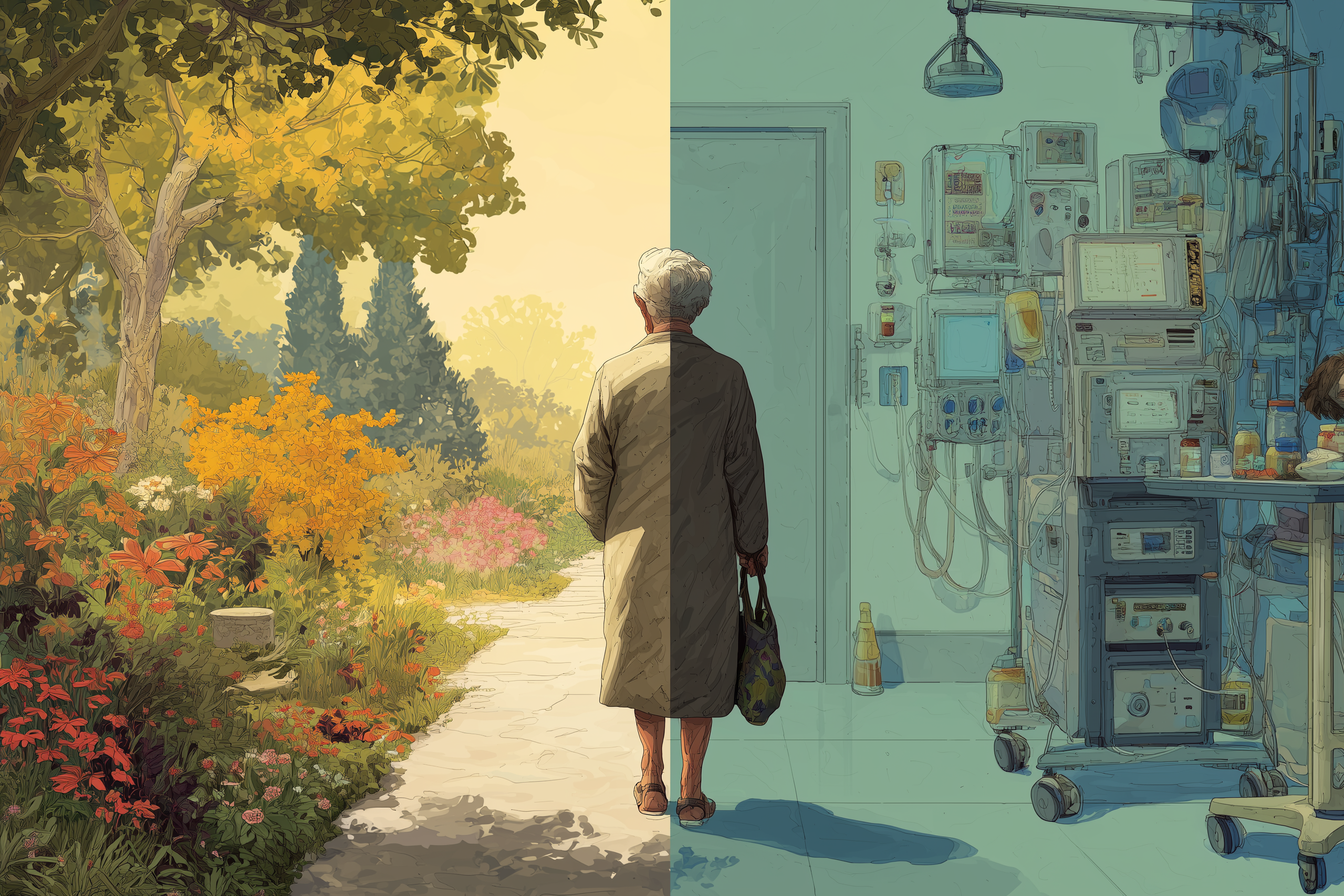If you could add 11 to 15 percent to your lifespan simply by changing how you think about tomorrow, would you do it?
Note: This article is for educational and informational purposes only. See full disclaimer at the end.
This isn’t wishful thinking. Harvard researchers studying nearly 70,000 women and 1,500 men found that optimists live, on average, 11 to 15 percent longer than pessimists [1]. They’re also significantly more likely to reach “exceptional longevity”—living past 85. The most optimistic women in the study had a 50 percent greater chance of reaching 90 compared to their pessimistic peers.
But here’s what makes this finding even more intriguing: only 25 percent of the longevity benefit could be explained by healthier behaviors like better diet and exercise [6]. The remaining 75 percent? That’s where the real mystery—and opportunity—lies.
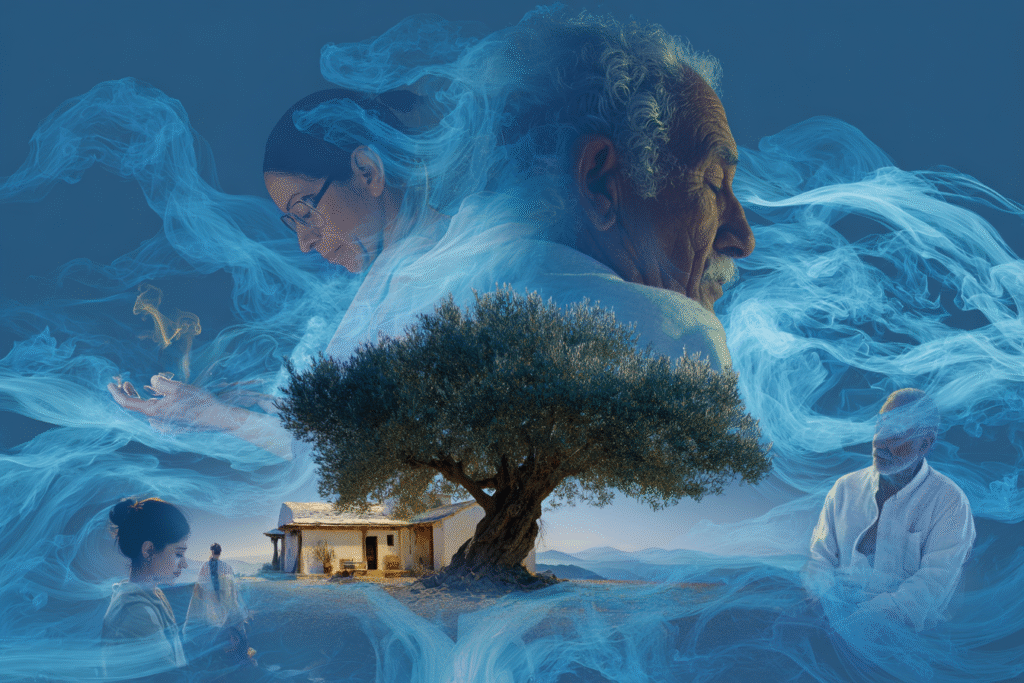
The Biology of Belief
Your mindset doesn’t just influence your mood; it literally changes your biology at the cellular level. When researchers examine the telomeres—protective caps on our chromosomes that shorten with age—they find something remarkable: psychological stress accelerates this shortening [5].
Women experiencing high chronic stress showed telomere shortening equivalent to a decade of additional aging compared to low-stress women. But here’s the crucial part: it’s not the stress itself that matters most—it’s how we perceive and respond to it.
The relationship between mindset and longevity operates through multiple biological pathways. Optimism correlates with lower levels of inflammation, healthier cholesterol profiles, and stronger immune function [7]. Pessimism, conversely, activates chronic stress responses that accelerate cellular aging through oxidative damage and shortened telomeres [3].
Think of it this way: every thought pattern you repeat is like a vote for how quickly or slowly your cells age.
The Longevity Multiplier
In Okinawa, they call it “ikigai.” In Costa Rica’s Nicoya Peninsula, it’s “plan de vida.” Both translate roughly to “reason for being” or “why I wake up in the morning.” And both are associated with something remarkable: knowing your sense of purpose is worth up to seven years of extra life expectancy [10].
This isn’t just correlation. Dr. Robert Butler, the first director of the National Institute on Aging, found that individuals who could clearly articulate their life purpose lived longer and maintained sharper cognitive function than those who couldn’t [8]. A subsequent study of 7,000 adults over 50 found that those with the lowest life-purpose scores were twice as likely to die within five years compared to those with the highest scores.
But here’s where modern life creates a paradox: we’re told to optimize everything—our bodies, our productivity, our social media presence—yet we rarely pause to ask why. We chase metrics without meaning, accumulating achievements that feel hollow the moment we attain them.
The Japanese concept of ikigai offers a different path. It sits at the intersection of four questions: What do you love? What are you good at? What does the world need? What can you be paid for? [11] When these align, you’ve found your ikigai—and potentially added years to your life.
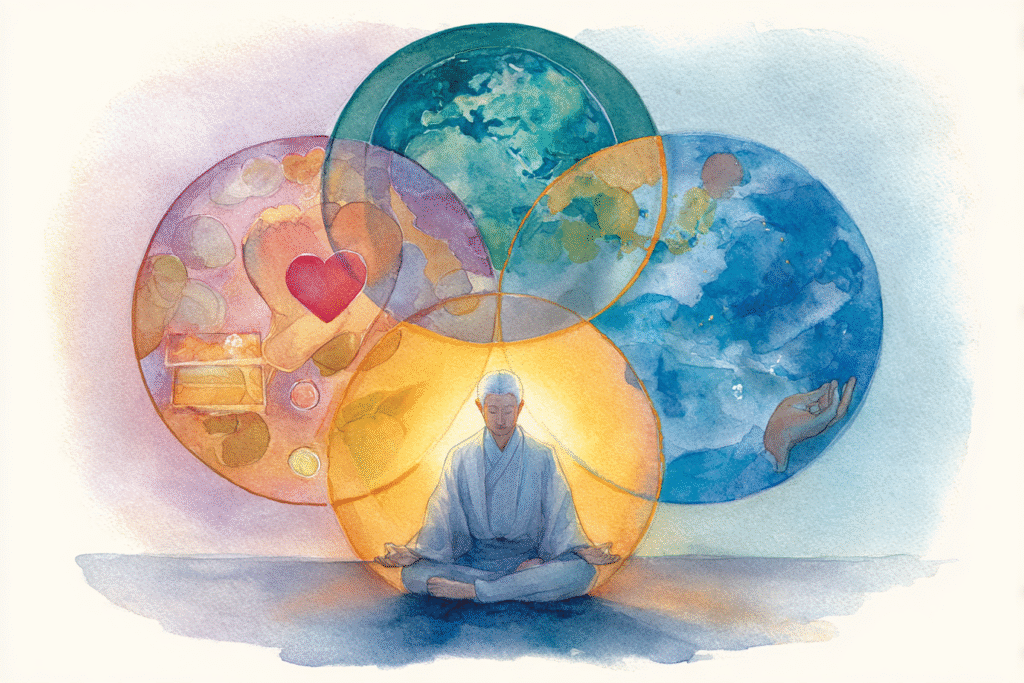
The Stress Paradox
Everyone in the Blue Zones—those rare places where people routinely live to 100—experiences stress. The difference? They have built-in routines to shed it [10]. Okinawans take moments to remember ancestors. Sardinians do happy hour. Ikarians take naps. Seventh-day Adventists pray.
These aren’t just quaint cultural practices. They’re biological necessities. Chronic stress leads to inflammation, which is associated with every major age-related disease. But the relationship between stress and aging isn’t straightforward—it’s mediated by our psychological response.
Recent research on epigenetic aging (how our experiences affect gene expression) reveals something fascinating: psychological resilience can actually buffer the effects of stress on biological aging [4]. Two people can experience the same stressful event, but the one with greater psychological resilience shows less epigenetic aging.
This challenges our cultural narrative about stress. We’ve been taught to eliminate stress, to optimize our lives for maximum comfort. But what if the goal isn’t to avoid stress but to change our relationship with it?
The Longevity Mindset Spectrum
Consider two 70-year-olds. One sees aging as inevitable decline, each birthday a step closer to incapacity. The other views aging as continued growth, each year bringing new wisdom and opportunities. Same chronological age, vastly different biological trajectories.
This isn’t just positive thinking. It’s about what researchers call “age beliefs”—our fundamental assumptions about what aging means. Those with positive age beliefs live an average of 7.5 years longer than those with negative age beliefs. They have better memory, stronger physical function, and are less likely to develop Alzheimer’s disease.
The mechanism? Positive age beliefs reduce stress responses to aging-related challenges. When you believe aging brings wisdom rather than just decline, a forgotten name becomes a momentary lapse rather than proof of deterioration. This difference in interpretation triggers vastly different biological responses.
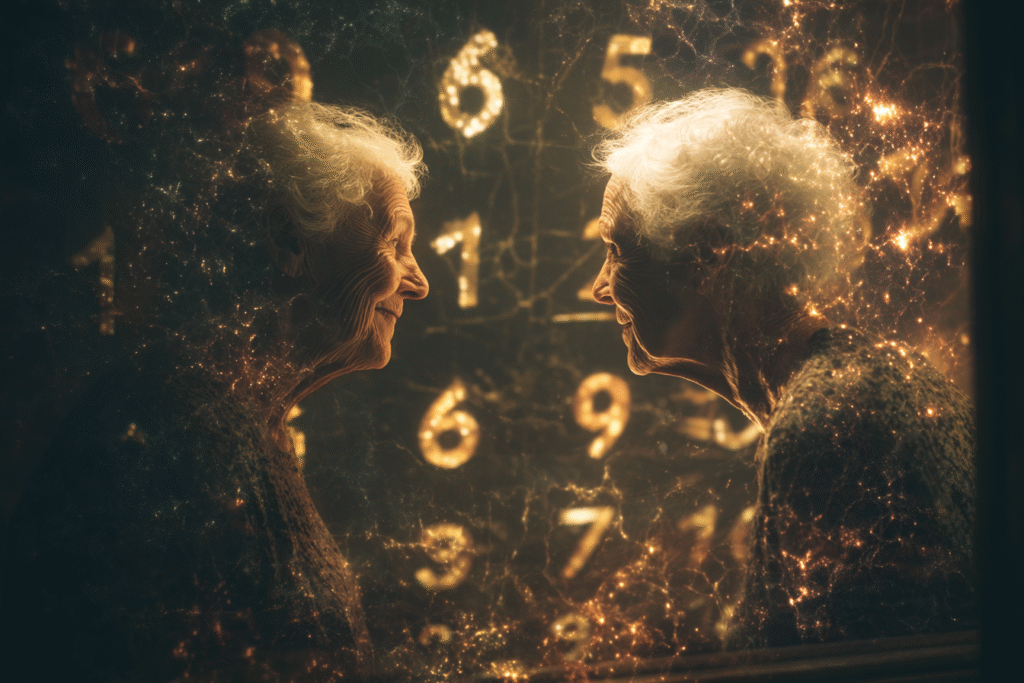
Cultural Scripts and Individual Reality
Most of us inherit our beliefs about aging from our culture, and in the West, those beliefs are predominantly negative. We associate aging with loss, irrelevance, and decline. We spend billions trying to look younger while accepting that feeling older is inevitable.
But longevity research from diverse populations challenges these assumptions. In many Blue Zone cultures, aging brings increased status and respect. Elders aren’t marginalized; they’re integral to family and community life [9]. This social integration itself becomes a longevity factor—grandparents who care for grandchildren have a higher chance of living longer.
The question becomes: how do we rewrite our psychological scripts about aging when we’re swimming in cultural messages that tell us youth is everything?
The Practice of Psychological Longevity
The good news is that optimism can be cultivated. Studies show that relatively brief interventions—writing exercises, meditation, cognitive-behavioral techniques—can enhance optimism [2]. One technique involves spending just a few minutes daily imagining your best possible self in various life areas. Participants who did this for two weeks showed increased optimism that persisted months later.
But this isn’t about forced positivity or denying real challenges. It’s about what psychologists call “realistic optimism”—maintaining hope and agency while acknowledging difficulties. The optimists who live longest aren’t those who ignore problems; they’re those who believe they can influence outcomes.
Purpose, too, can be developed. It doesn’t require a grand mission or career change. For some, purpose comes from gardening. For others, it’s watching grandchildren grow or mastering a craft [8]. The key is engagement—being absorbed in something that matters to you, something that gets you up in the morning.
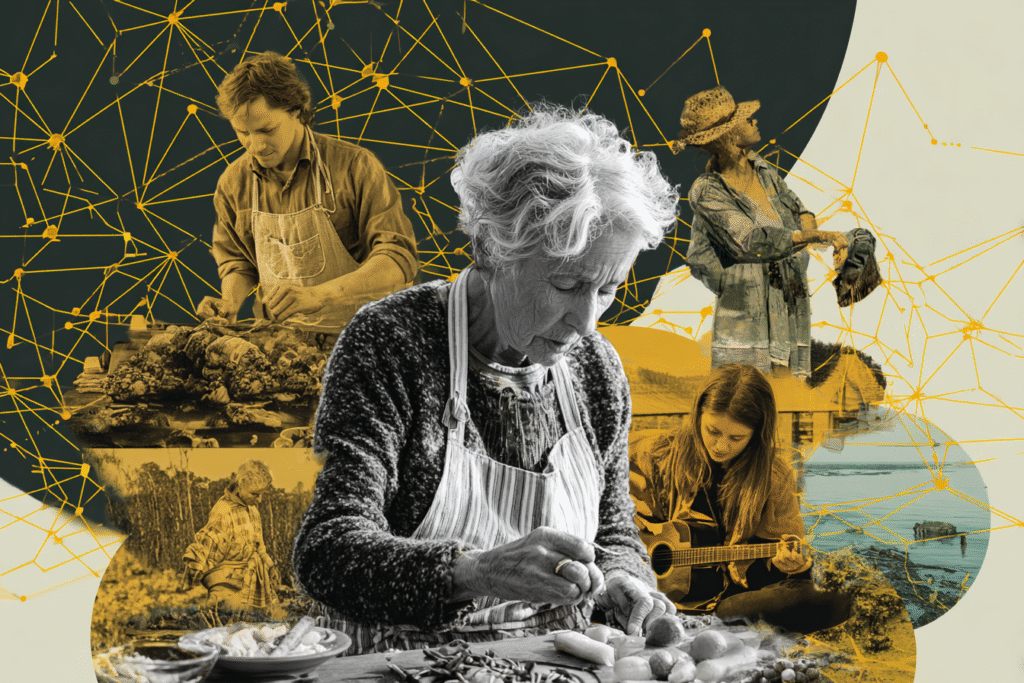
The Compound Effect of Mental Habits
Here’s what the research ultimately reveals: our psychological patterns compound over time, just like interest in a bank account. Each optimistic interpretation, each moment of purpose-driven action, each successful stress recovery adds to our biological reserves.
The 11 to 15 percent lifespan increase seen in optimists? That translates to roughly 8 to 12 extra years for the average person. Years not just of survival, but of engaged, purposeful living. Because optimists don’t just live longer—they report higher quality of life throughout those extra years.
This creates a virtuous cycle. Positive psychological states promote healthier behaviors and stronger social connections, which reinforce positive mental states, which further support biological health. The rich get richer, but the currency here isn’t money—it’s years of vibrant life.
Beyond Individual Psychology
Perhaps the most profound insight from longevity psychology research is this: our mindset about aging doesn’t just affect us individually. It shapes how we treat older adults, which affects their health outcomes. It influences healthcare decisions, social policies, and family dynamics.
When we fear aging, we distance ourselves from older adults, creating the very isolation that accelerates their decline. When we see aging as decline, we lower our expectations, creating self-fulfilling prophecies. But when we recognize aging as a continuation of growth, we create environments that support longevity for everyone.
The Okinawan concept of “moai”—lifelong friend groups that provide social, financial, and emotional support—exemplifies this [11]. These groups, formed in childhood and maintained throughout life, create a psychological safety net that supports longevity for all members.

A Daily Choice
Every day, we make thousands of micro-decisions about how to interpret our experiences. Is that ache a sign of inevitable decline or a reminder to move more mindfully? Is retirement the end of productivity or the beginning of a new chapter? Is stress wearing us down or building our resilience?
These aren’t just philosophical questions—they’re biological ones. Each interpretation triggers cascades of hormones, inflammatory markers, and gene expression changes that either accelerate or decelerate aging.
The psychology of longevity isn’t about denying reality or forcing positivity. It’s about recognizing that our subjective experience of aging powerfully influences our objective biological aging. It’s about understanding that meaning, purpose, and optimism aren’t just nice-to-haves—they’re longevity interventions as powerful as any pharmaceutical.
As we navigate our obsession with immediate gratification and quick fixes, perhaps the most radical thing we can do is to think longer-term—not just about our finances or careers, but about our psychological foundations. Because while we can’t control our genetics or eliminate all stress, we can choose how we think about tomorrow.
And that choice, repeated daily, might just add a decade to our lives.
See you in the next insight.
Comprehensive Medical Disclaimer: The insights, frameworks, and recommendations shared in this article are for educational and informational purposes only. They represent a synthesis of research, technology applications, and personal optimization strategies, not medical advice. Individual health needs vary significantly, and what works for one person may not be appropriate for another. Always consult with qualified healthcare professionals before making any significant changes to your lifestyle, nutrition, exercise routine, supplement regimen, or medical treatments. This content does not replace professional medical diagnosis, treatment, or care. If you have specific health concerns or conditions, seek guidance from licensed healthcare practitioners familiar with your individual circumstances.
References
The references below are organized by study type. Peer-reviewed research provides the primary evidence base, while systematic reviews synthesize findings.
Peer-Reviewed / Academic Sources
- [1] Proceedings of the National Academy of Sciences (2019). Optimism is associated with exceptional longevity in 2 epidemiologic cohorts of men and women. https://www.pnas.org/doi/10.1073/pnas.1900712116
- [2] National Center for Biotechnology Information (2019). Optimism is associated with exceptional longevity in 2 epidemiologic cohorts of men and women. PMC. https://www.ncbi.nlm.nih.gov/pmc/articles/PMC6744861/
- [3] International Journal of Environmental Research and Public Health (2019). Psychological Wellbeing and Healthy Aging: Focus on Telomeres. PMC. https://pmc.ncbi.nlm.nih.gov/articles/PMC6473912/
- [4] Translational Psychiatry (2021). Psychological and biological resilience modulates the effects of stress on epigenetic aging. https://www.nature.com/articles/s41398-021-01735-7
- [5] Proceedings of the National Academy of Sciences (2004). Accelerated telomere shortening in response to life stress. https://www.pnas.org/doi/10.1073/pnas.0407162101
Government / Institutional Sources
- [6] National Institute on Aging (2022). Optimism linked to longevity and well-being in two recent studies. https://www.nia.nih.gov/news/optimism-linked-longevity-and-well-being-two-recent-studies
Industry / Technology Sources
- [7] TIME (2016). Optimism: How Your Outlook Affects Your Lifespan. https://time.com/4595633/optimism-live-longer/
- [8] Blue Zones (2021). NEWS: Huge Study Confirms Purpose and Meaning Add Years to Life. https://www.bluezones.com/2019/05/news-huge-study-confirms-purpose-and-meaning-add-years-to-life/
- [9] Healthline (2024). Why People in “Blue Zones” Live Longer Than the Rest of the World. https://www.healthline.com/nutrition/blue-zones
- [10] Blue Zones (2016). Power 9® – Blue Zones. https://www.bluezones.com/2016/11/power-9/
- [11] Boldin (2025). Blue Zones Report: 3 Okinawan Secrets to a Long Emotionally, Intellectually, and Physically Healthy Life. https://www.boldin.com/retirement/okinawan-secrets-to-a-long-life-1-ikigai-2-moai-3-hara-hachi-bu-huh/


